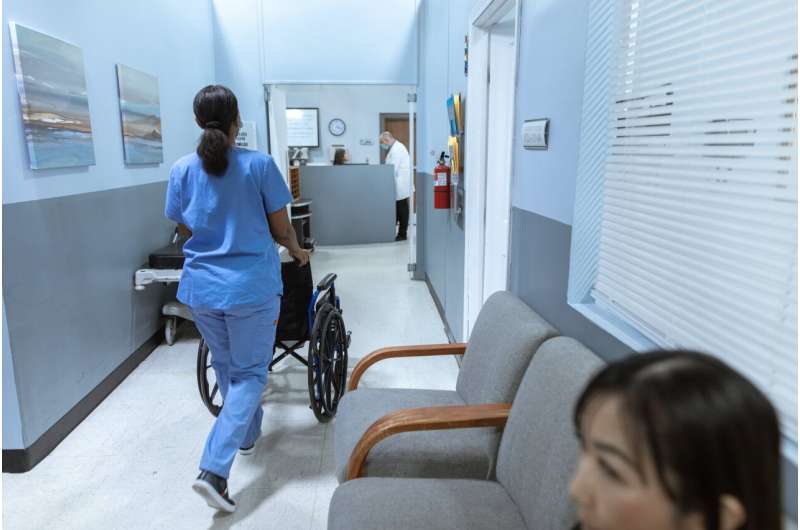This article has been reviewed according to Science X's editorial process and policies. Editors have highlighted the following attributes while ensuring the content's credibility:
fact-checked
peer-reviewed publication
trusted source
proofread
Patients with improved discharge planning less likely to be readmitted, finds study

Patients given transitional care before and during discharge from hospital—such as joint discharge planning follow up visits or phone calls—are less likely to be readmitted according to University of Manchester researchers.
The meta study of data from 126 trials with 97,408 participants, published in JAMA Network Open on Nov. 30, showed the interventions were associated with significant reductions in the odds of readmissions at 180 days after discharge. The paper is titled "Transitional care interventions from hospital to community to reduce health care use and improve patient outcomes: A systematic review and network meta-analysis."
The research team analyzed different types discharge interventions:
The low complexity interventions they studied, comprising between 1 and 3 changes to usual care applied together were associated with a 55% reduction in readmissions. The changes differed across the studies but could include improved discharge planning, medication review, case management, multi-agency team meetings, psychological support and home visits, peer support
The high complexity interventions, which included eight or more of the above changes to usual practice applied together, were associated with a 24% reduction.
The medium complexity interventions, with four to seven changes to usual care, were associated with a 42% reduction.
Even at 30 days, the low complexity interventions were associated with a 22% decrease in the odds of readmission and the medium complexity interventions were associated with a 18% decrease.
Low and medium complexity transitional care interventions also seemed to be better for reducing health care needs for patients transitioning from hospitals to the community.
Medium-complexity interventions, they found, might be best for reducing harms to patients from adverse events and medication adherence.
High complexity interventions, might be the most helpful for improving patient satisfaction.
Other findings included:
- The odds of emergency department visits following discharge was 32% for low complexity interventions.
- The odds of reducing adverse events was 58% following discharge for medium complexity interventions.
- The odds of improving medication adherence was 51% for medium complexity interventions.
- None of the interventions were associated with improved uptake, general, mental, or physical quality of life, and primary care/outpatient visits.
Lead author Dr. Natasha Tyler, a research fellow from The University of Manchester said, "This study shows that transitional care arrangements are a powerful way to avoid readmission to hospital because patients feel more involved in decisions and supported during a particularly vulnerable stage in the care pathway.
"It is well known that an increased demand for urgent hospital care has created pressure to discharge patients to the community. We know some of those patients are discharged too early or without necessary support to recover in the community.
"There is also evidence that 1 in 5 patients may experience suboptimal or unsafe care around the time of discharge from hospital mainly because of the prompt reduction in continuity of care and co-ordination challenges of multiple independent professionals and agencies.
"This is why it is important to understand the value of intermediate care and how best that is delivered.
Principal investigator Dr. Maria Panagioti, senior lecturer from The University of Manchester, said, "This study shows that more changes to usual practice are not always better to reduce health care needs and prevent emergency department visits for patients transitioning from hospital to the community.
"We need to think about what changes to the usual care are truly meaningful for patients, whether professionals can implement those changes and how those changes can work together as a coherent bundle of care.
"We strongly recommend that the NHS develops of a set of patient and staff-reported outcomes to better capture the full range of benefits and impacts of transitional care interventions especially those of high complexity."
More information: Natasha Tyler et al, Transitional care interventions from hospital to community to reduce health care use and improve patient outcomes, JAMA Network Open (2023). DOI: 10.1001/jamanetworkopen.2023.44825



















